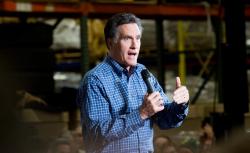Mitt Romney is now being protected by the Secret Service. Unfortunately for him, they were not in a position to jump in front of his comments Wednesday morning. The day after his Florida triumph, Romney told CNN: “I’m not concerned about the very poor. We have a safety net there. If it needs repair, I’ll fix it. I’m not concerned about the very rich, they’re doing just fine. I’m concerned about the very heart of America, the 90 percent, 95 percent of Americans who right now are struggling.”
This statement is striking for many reasons. Most are obvious—it is thoroughly ham-fisted for a politician to ever say he doesn’t care about part of the electorate, particularly the “very poor.” Everyone knows that much. But Romney’s gaffe signals something more about the general election to come. As it looks more likely that Obama and Romney will square off, we are faced with a new prospect: The 2012 presidential election may devolve into a battle between two aloof men trading charges about who is more out of touch.
Romney’s slip has faint echoes of some of Barack Obama’s own tone-deaf remarks from the last election. In the 2008 race, when Obama said the economy caused people to “cling to their guns and religion,” it was the perfect encapsulation of a stereotype that Republicans had been sketching for months: Obama was smug, detached, and clueless. When the Democratic candidate with the Ivy League pedigree seemed dismissive of two things conservatives cherish, it intensified the feeling. I’ve heard this played back relentlessly on the GOP campaign trail this election. Romney has now offered his own encapsulating blunder, lightening the load for every Democratic advance man charged with making sure the crowds are raucous and ready. Anyone warming up the crowd for President Obama need only repeat these words and the roars will begin.
There must be a German word for Romney’s particular gift for stumbling at the moment of political triumph. This isn’t the first time the wealthy Romney has freshened the image of himself as disconnected from the plight of those less fortunate than he (which, after all, is most of us). After his resounding win in New Hampshire, Romney said that income inequality was the product of “envy” and that the topic should be discussed only in “quiet rooms.”
Polling suggests that voters find President Obama more empathetic with their plight than Mitt Romney. Fifty-five percent of voters see President Obama as doing a decent job connecting with average Americans, including 30 percent who say he does so very well, according to a recent Washington Post poll. Thirty-nine percent of registered voters see former Massachusetts Gov. Mitt Romney as connecting at least “fairly well” with the same group, although a slender 7 percent say “very well.”
Mitt Romney has a single job as the Republican frontrunner: to keep the country focused on Barack Obama’s dismal record. Comments like this one distract from that purpose in two ways. They put Romney on the defensive. Of course I care about the poor, he now must say. (There are 46 million of them after all, even if they don’t vote much.) They also make it much harder for him to paint the president as out of touch when he looks out of touch himself. Predictably, Romney has been hit from the left for his insensitivity and cluelessness. From the right, commentators say his answer doesn’t sound very conservative because it seems to accept the permanence of the safety net. Newt Gingrich naturally pounced on Romney’s mistake. Citing the remarks in a rally Wednesday, Gingrich said he was “fed up with politicians dividing Americans.”
Still, if you look at the context of Romney’s remarks, they are defensible. He has said similar things many times. In a time of limited government resources, he wants to spend precious government dollars on the middle class first, which he thinks is the pressing problem. He may be wrong about the stability of the safety net and his programs might not help the middle class, but those are different questions than whether he is a scrooge.
Romney’s campaign is in a rush to clean up after the candidate, demanding that he be judged in context. But they don’t have much grounds for complaint. Romney’s first ad attacking President Obama took remarks he made about the economy wildly out of context. In a speech during the 2008 election, Obama quoted an aide to John McCain saying, “If we keep talking about the economy, we’re going to lose.” The Romney campaign made it look like the words had come from Obama, not the McCain aide. So Romney’s team has no grounds to cry foul now if Democrats run up and down the street saying that Romney doesn’t care about poor people. And the Secret Service can’t protect him from that, either.
